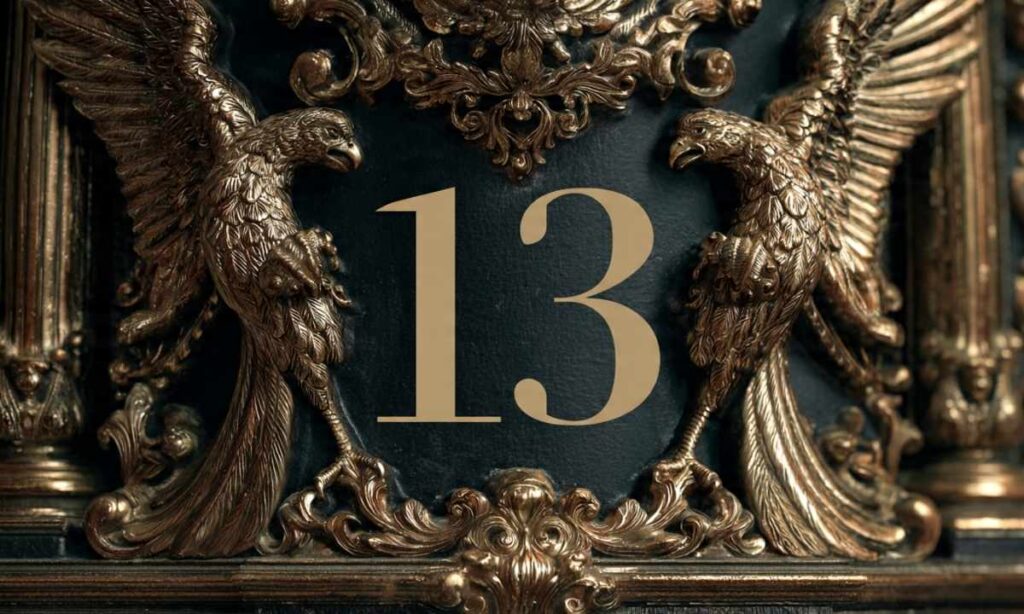The number 13 holds a special place in biblical history. Many people see it as unlucky, but the Bible tells a different story. This number appears in important moments throughout Scripture.
In ancient Hebrew culture, numbers carried deep meanings. The number 13 often represents rebellion and chaos in biblical texts. However, it also connects to significant events and people in God’s plan.
Understanding biblical numbers helps us see deeper truths in Scripture. The number 13 appears in both the Old and New Testaments. Learning about this number can enrich our faith and Bible study.
Number 13 Meaning In The Bible — Significant Old Testament Occurrences
The earliest mention of the number thirteen in the Bible can be found in the Book of Genesis in the Old Testament.
“Twelve years they served Chedorlaomer, and in the thirteenth year they rebelled.” (Genesis 14:4)
The number 13 often appears in contexts of rebellion, apostasy, or corruption in the Bible. Here, the thirteenth year marks a rebellion against authority. This pattern repeats throughout Scripture—13 is frequently associated with opposition to God’s order, making it symbolically significant as a number linked to defiance and spiritual falling away.
Number 13 Meaning In The Bible — Abraham, Ishmael and Isaac
The number 13 appears significantly in the family history of Abraham, particularly concerning Ishmael versus Isaac—representing the contrast between human effort and divine promise.
“And Ishmael his son was thirteen years old when he was circumcised in the flesh of his foreskin.” (Genesis 17:25)
Ishmael was born when Abraham attempted to fulfill God’s promise through human means with Hagar. Significantly, Ishmael was 13 years old when he was circumcised—the same year God appeared to Abraham to establish the covenant and promise Isaac’s birth (Genesis 17).
This timing is profound: 13 marks the transition point where God rejected the fruit of human effort (Ishmael) and reaffirmed His promise of Isaac, the child of faith. Ishmael, though blessed, would not be the child of covenant. Isaac, born when Abraham was 100 and Sarah was 90, represented supernatural divine intervention.
The number 13 here symbolizes the inadequacy of human schemes to accomplish God’s purposes. Ishmael at 13 represents the fullness of Abraham’s fleshly attempt, but God’s true promise would come through Isaac alone. This reflects the biblical pattern where 13 often indicates rebellion against or deviation from God’s perfect plan, while also marking a point of divine correction and reestablishment of true covenant relationship.
Number 13 Meaning In The Bible — The Book Of Esther

The number 13 appears at a pivotal moment in Esther, marking one of the most dramatic instances of evil conspiracy and divine deliverance in Scripture.
“And the letters were sent by couriers into all the king’s provinces, to destroy, to kill, and to annihilate all the Jews, both young and old, little children and women, in one day, on the thirteenth day of the twelfth month, which is the month of Adar, and to plunder their possessions.” (Esther 3:13)
The 13th day of the 12th month was appointed by Haman for the complete annihilation of the Jewish people—a genocidal plot that embodies rebellion against God’s chosen people and His divine purposes. This date was selected by casting lots (Pur), but evil’s chosen day would become the stage for God’s redemptive intervention.
The significance of 13 here aligns with its biblical pattern of rebellion and opposition to God. Haman’s decree on the thirteenth day, descendant of Agag the Amalekite (Israel’s ancient enemy), represents satanic hatred toward God’s covenant people. The 13th day was meant to be Israel’s end.
However, God sovereignly reversed the plot. On the very 13th day of Adar, the Jews were granted authority to defend themselves and triumph over their enemies (Esther 9:1). What was designed as a day of destruction became a day of deliverance and celebration—the origin of the Feast of Purim.
The number 13 in Esther demonstrates that even when evil schemes reach their appointed day of rebellion, God’s providence transforms judgment into salvation, turning the enemy’s weapon back upon themselves.
Number 13 Meaning In The Bible — Noah’s Curse on Canaan
The number 13 appears in connection with Canaan through the listing of his descendants, marking a lineage that would become synonymous with wickedness and opposition to God’s people.
“Canaan begot Sidon his firstborn, and Heth; the Jebusite, the Amorite, and the Girgashite; the Hivite, the Arkite, and the Sinite; the Arvadite, the Zemarite, and the Hamathite. Afterward the families of the Canaanites were dispersed.” (Genesis 10:15-18)
After Ham dishonored his father Noah, Noah pronounced a curse upon Ham’s son Canaan (Genesis 9:25). Significantly, Genesis 10 lists exactly 13 descendants/tribes of Canaan—Sidon, Heth, the Jebusites, Amorites, Girgashites, Hivites, Arkites, Sinites, Arvadites, Zemarites, Hamathites, plus two others in various counts.
This listing of 13 is prophetically significant. The Canaanite nations became the epitome of moral corruption, idolatry, and abomination—practicing child sacrifice, temple prostitution, and perverse rituals that defiled the Promised Land. God commanded Israel to drive them out completely because their rebellion against divine order had reached full measure (Leviticus 18:24-28).
The number 13 associated with Canaan’s lineage reflects the biblical pattern of apostasy and corruption. These nations would become Israel’s persistent enemies and stumbling blocks, constantly tempting God’s people toward idolatry. The curse on Canaan, marked by this number, demonstrates how rebellion compounds through generations when unrepented, ultimately requiring divine judgment.
Number 13 Meaning In The Bible — Rebellion Against the Promised Land
The number 13 appears prominently in Israel’s greatest act of rebellion—the refusal to enter the Promised Land after the spies’ report, marking a catastrophic turning point in their wilderness journey.
“And the LORD spoke to Moses, saying, ‘Send men to spy out the land of Canaan, which I am giving to the children of Israel; from each tribe of their fathers you shall send a man, every one a leader among them.'” (Numbers 13:1-2)
Moses sent 12 spies to scout the Promised Land for 40 days (Numbers 13:25). Ten spies returned with a fearful, unbelieving report, while only two—Joshua and Caleb—trusted God’s promise. Critically, the rebellion that followed occurred in the 13th month after the Exodus, when they should have been entering their inheritance.
The connection to 13 is significant: Numbers 13 records this pivotal rebellion where Israel rejected God’s gift, refused His promise, and even plotted to return to Egyptian bondage (Numbers 14:1-4). This represents the ultimate apostasy—turning away from divine blessing back toward slavery.
God’s judgment was severe: that entire generation would wander 40 years in the wilderness—one year for each day of spying—and die without entering the land (Numbers 14:33-34). The number 13 marks the chapter where unbelief, rebellion, and rejection of God’s purposes reached their climax.
This account embodies the biblical symbolism of 13: rebellion against God’s covenant promises, choosing fear over faith, and the catastrophic consequences when God’s people refuse His provision and turn back from His purposes.
Number 13 Meaning In The Bible — The Destruction of Jericho

The number 13 appears in the divine battle strategy for conquering Jericho, Israel’s first victory in the Promised Land, demonstrating God’s power over rebellious nations.
“And seven priests shall bear seven trumpets of rams’ horns before the ark. But the seventh day you shall march around the city seven times, and the priests shall blow the trumpets.” (Joshua 6:4)
God commanded Israel to march around Jericho once daily for six days, then seven times on the seventh day—totaling 13 circuits around the city (6 + 7 = 13). After the 13th march, the priests blew the trumpets, the people shouted, and Jericho’s walls collapsed (Joshua 6:20).
This numerical pattern is profoundly significant. Jericho represented Canaan’s rebellion and wickedness—a fortified stronghold of pagan resistance against God’s purposes. The city embodied the corruption that had filled the land for generations, making it ripe for divine judgment.
The 13 circuits symbolize the complete exposure and judgment of rebellion. Just as 13 biblically represents apostasy and opposition to God, the 13th march marked the fullness of Jericho’s rebellion being measured and found worthy of destruction. The number speaks to God’s patience reaching its limit and His righteous judgment falling.
Remarkably, only Rahab and her household—who demonstrated faith by hiding the Israelite spies—were spared. The conquest of Jericho through 13 circuits demonstrates that when rebellion is complete, God’s judgment is thorough, but His mercy still extends to those who trust Him. Jericho marched around 13 times stands as a powerful testament to divine authority and testing.
Number 13 Meaning In The Bible — King Solomon’s House
The number 13 appears in the construction timeline of Solomon’s personal palace, revealing a troubling contrast with the temple of God and hinting at Solomon’s eventual spiritual decline.
“But Solomon took thirteen years to build his own house; so he finished all his house.” (1 Kings 7:1)
Solomon built the magnificent Temple of the LORD in seven years (1 Kings 6:38)—seven being the biblical number of completion and divine perfection. However, he spent 13 years building his own palace complex—nearly twice as long as God’s house. King Solomon’s 13-year palace construction reveals significant spiritual implications.
This contrast is spiritually significant and ominous. While Solomon’s wisdom and wealth were gifts from God meant to glorify Him, the 13 years spent on his personal dwelling suggests misplaced priorities and growing self-focus. The number 13 here marks a subtle shift from devotion to God toward self-aggrandizement.
This foreshadows Solomon’s later rebellion. Despite his wisdom, Solomon accumulated 700 wives and 300 concubines who “turned his heart after other gods” (1 Kings 11:3-4). He built high places for foreign deities, directly violating God’s commands. His heart was “not loyal to the LORD his God” (1 Kings 11:4).
The 13 years in his palace symbolizes the beginning of spiritual compromise—investing more in earthly glory than divine purposes. It reflects the biblical pattern where 13 represents deviation from God’s ideal, apostasy in development, and the seeds of rebellion that would eventually split his kingdom.
Solomon’s greatest wisdom couldn’t prevent his greatest folly, and the number 13 marks where priorities began shifting from God’s glory to personal magnificence.
Number 13 Meaning In The Bible — Jeremiah’s Ministry
The number 13 appears significantly in the prophetic ministry of Jeremiah, who warned Judah of impending judgment due to their persistent rebellion against God.
“From the thirteenth year of Josiah the son of Amon, king of Judah, even to this day, this is the twenty-third year in which the word of the LORD has come to me; and I have spoken to you, rising early and speaking, but you have not listened.” (Jeremiah 25:3)
Jeremiah’s prophetic calling began in the 13th year of King Josiah’s reign (Jeremiah 1:2; 25:3)—approximately 627 B.C. This timing is profoundly significant. Despite Josiah’s righteous reforms, Judah’s heart remained hardened in idolatry and covenant-breaking.
The number 13 marking the start of Jeremiah’s ministry symbolizes the nation’s deep-rooted rebellion. He was called the “weeping prophet” because his message of judgment was consistently rejected. For over 40 years, Jeremiah pleaded with Judah to repent, warning that Babylonian exile was imminent if they continued their apostasy.
Jeremiah 25 records that after 23 years of faithful warning (from year 13 of Josiah), the people still refused to listen. The chapter prophesies 70 years of Babylonian captivity—God’s ultimate judgment on their stubborn rebellion.
The 13th year as Jeremiah’s starting point reflects the biblical pattern: 13 marks rebellion, apostasy, and opposition to God. Jeremiah’s entire ministry was defined by confronting a nation in full rebellion, announcing judgment upon those who repeatedly rejected God’s covenant. The number 13 here represents the spiritual condition of Judah—a people so steeped in wickedness that even a king’s reforms couldn’t turn their hearts, requiring a prophet to announce their unavoidable destruction.
Number 13 Meaning In The Bible — New Testament Occurrences
The number 13 appears less often in the New Testament than the Old Testament. Jesus chose 12 disciples, making 13 people with Him at the Last Supper. This group included Judas, who betrayed Jesus. Many scholars see this as another link between 13 and betrayal or rebellion in Scripture.
Number 13 Meaning In The Bible — The Last Supper
The Last Supper is the most famous example of 13 in the New Testament. Jesus sat with His 12 disciples around the table. This made 13 people total at that final meal. One of them, Judas Iscariot, would soon betray Jesus for 30 pieces of silver. The Last Supper and number 13 connection has profound theological significance in Christian tradition.
Number 13 Meaning In The Bible — The Apostle Paul
“While they were worshiping the Lord and fasting, the Holy Spirit said, ‘Set apart for me Barnabas and Saul for the work to which I have called them.'” (Acts 13:2)
This verse from Acts chapter 13 marks the beginning of Paul’s (then called Saul) first missionary journey. The number 13 appears in the chapter reference, and this passage shows God’s specific calling on Paul’s life to spread the Gospel to the Gentiles. It represents divine appointment and the start of Paul’s apostolic ministry that would transform early Christianity. Apostle Paul as the 13th apostle holds special significance in understanding number 13 and covenant symbolism.
Number 13 Meaning In The Bible — Mark of the Beast
“This calls for wisdom. Let the person who has insight calculate the number of the beast, for it is the number of a man. That number is 666.” (Revelation 13:18)
This verse from Revelation chapter 13 discusses the infamous “mark of the beast” and introduces the number 666. Chapter 13 of Revelation describes two beasts – one from the sea and one from the earth – representing evil powers that oppose God and persecute believers during the end times. Revelation 13:18 interpretation reveals deep prophetic meaning about the end times. 13 occurrences in Revelation provide crucial insight into biblical prophecy. Satan and number 13 connection is particularly evident in this apocalyptic text.
Meaning of Numbers: The Number 13
The word thirteen appears fifteen times in the King James Version of the Bible, and interestingly, all of these references are found in the Old Testament. The books where it appears most frequently include Joshua, Numbers, and 1 Chronicles. This shows that the number held some degree of importance in the early records of Israel’s history.
In biblical symbolism, the number thirteen is often linked with rebellion and disobedience. One example is Nimrod, the mighty hunter mentioned in Genesis, who tried to exalt himself in place of God. He was the thirteenth generation from Ham, one of Noah’s sons who survived the great flood. Nimrod and rebellion in the Bible highlights the number of rebellion in scripture. This connection emphasizes Nimrod’s rebellion biblical meaning and its lasting theological impact.
Because of these associations, many Bible scholars view the number thirteen as representing human systems or powers that rise in opposition to God’s rule. It symbolizes mankind’s tendency to establish authority apart from the Creator, often leading to confusion and spiritual rebellion. Understanding biblical numerology of 13 helps reveal divine patterns in Scripture.
Appearances of the Number Thirteen
The number thirteen appears in several interesting ways throughout Scripture. The longest book name in the Bible, Thessalonians, contains exactly thirteen letters. In Romans chapter 1, Paul lists twenty-three traits of those who reject God’s truth — and the thirteenth on that list describes them as “haters of God.” This subtle detail gives the number thirteen a symbolic link to rebellion and defiance.
In the book of Esther, Haman plotted the destruction of the Jewish people by issuing a decree on the thirteenth day of the month of Nisan, declaring that all Jews should be killed on the thirteenth day of Adar. However, through the courage of Queen Esther and the wisdom of Mordecai, his evil plan was overturned. Similarly, in the story of Jericho, the Israelites marched around the city thirteen times before it fell — showing how God’s power triumphed over human strength.
Even King Solomon’s actions reflect this number’s theme. He spent seven years building the temple for God, yet took thirteen years to complete his own palace. The Bible also records at least thirteen famines across different times and places, and in Mark 7, Jesus lists thirteen sins that defile a person. Thirteen sins listed by Jesus (Mark 7:20-23) demonstrate the completeness of human moral corruption. Each of these examples connects the number 13 with human weakness, pride, and the consequences of turning away from God’s guidance. These patterns reveal what 13 represents spiritually and its role as a number 13 as a symbol of testing.
The Number of Evil
The word Hinnom appears thirteen times across eleven verses in the King James Bible. The Valley of Hinnom, located outside Jerusalem, became infamous for the pagan rituals carried out there in worship of the false god Molech. Valley of Hinnom meaning in the Bible represents one of the darkest places of apostasy in Israel’s history. Sadly, even King Solomon allowed such practices to continue in order to please his foreign wives. This valley became a place of terrible evil, where people turned away from the true God.
In the books of Jeremiah, God condemns the horrific acts committed in the Valley of Hinnom, where children were sacrificed by fire to Molech. These rituals were a direct violation of God’s commands and an abomination in His sight. The valley’s association with fire and destruction later became a powerful symbol of divine judgment — a fitting image of the eternal punishment awaiting unrepentant sinners.
In the New Testament, the Greek word drakon, meaning “dragon,” also appears thirteen times — all within the book of Revelation. This term is used as a symbol for Satan, the great deceiver who leads the world astray and stands in opposition to God. The parallel use of the number thirteen in connection with Hinnom and drakon reinforces its biblical link to rebellion, sin, and the forces of evil. This connection illustrates spiritual warfare and the number 13 throughout Scripture.
Number 13 and God’s Character

After the Israelites sinned by worshipping the golden calf, Moses broke the first set of stone tablets that contained the Ten Commandments. Later, God commanded him to carve out a new pair of tablets so that His laws could be written once again (Exodus 34:1). This act symbolized both judgment for sin and the possibility of divine forgiveness.
When Moses ascended Mount Sinai with the newly carved tablets, the Lord’s presence surrounded him like a thick cloud. There, God renewed His covenant and revealed the depth of His compassion toward His people. It was a moment of restoration — a reminder that even after failure, mercy could still be found in God’s presence.
According to Jewish tradition, during this encounter, God proclaimed thirteen distinct expressions of His mercy. These “Thirteen Attributes of Divine Compassion,” drawn from Exodus 34:6–7, reveal the Lord’s character as patient, loving, just, and forgiving — showing that His grace extends even to those who have fallen short. God’s 13 attributes of mercy demonstrate God’s grace through the number 13 and reveal redemptive power of number 13 in bringing divine transformation through rebellion. This shows God’s mercy after rebellion and illustrates number 13 and God’s sovereignty working together for redemption.
FREQUENTLY ASKED QUESTIONS
What does the number 13 symbolize in the Bible?
The number 13 is often associated with rebellion, apostasy, and disorder, as it exceeds the number 12 which represents divine perfection and governmental authority. Number 13 symbolism in the Bible reveals deep theological patterns throughout Scripture. Understanding what the number 13 means in the Bible KJV helps illuminate the spiritual meaning of 13 in Christian theology.
Where does 13 first appear in Scripture?
The number 13 first appears in Genesis 14:4 where it states “in the thirteenth year they rebelled,” establishing an early connection between 13 and rebellion. Genesis 14:4 meaning establishes the foundational pattern for the number 13 and rebellion throughout the rest of Scripture. This demonstrates the meaning of 13 in Hebrew culture and theology.
Is the number 13 always negative in the Bible?
No, 13 appears in neutral contexts like genealogies and can represent transition; 1 Corinthians 13, the famous love chapter, shows the number in a positive light. While often linked to rebellion, the significance of number 13 in Christianity includes both negative and positive dimensions, showing the symbolic meaning of the number thirteen is context-dependent.
What is the significance of Revelation 13?
Revelation 13 describes the beast and the mark of the beast (666), representing the ultimate rebellion against God and persecution of believers during the end times. Revelation 13:18 interpretation is central to understanding end-times prophecy and prophetic meaning of 13 in scripture.
Why was Ishmael circumcised at age 13?
Ishmael was circumcised at 13 (Genesis 17:25), which some scholars interpret as symbolizing human effort and fleshly works rather than God’s promised blessing through Isaac. Genesis 17:25 Ishmael’s circumcision represents Ishmael’s circumcision at age 13 as a theological marker of human attempts versus divine promise.
Does Jesus and His 12 disciples equal 13?
Yes, Jesus with His 12 disciples totals 13, which some view positively as Christ (the head) united with His body (the church), representing divine leadership with God’s people. The Last Supper and number 13 shows how this number can represent both betrayal and divine fellowship.
What happened on the 13th day in the Book of Esther?
The 13th day of the 12th month was chosen by Haman to destroy the Jews (Esther 9:1), but God turned this day of intended destruction into deliverance and celebration. Esther 3:13 significance and the thirteenth day in the Book of Esther demonstrate God’s providential reversal of evil schemes.
CONCLUSION
The number 13 in the Bible carries deep meaning that goes beyond simple superstition. From its first appearance in Genesis as a symbol of rebellion to its prominent role in Revelation 13, this number often represents opposition to God’s perfect order. However, the Bible also shows us that 13 can appear in positive contexts, like the beautiful love chapter in 1 Corinthians 13. What matters most is understanding Scripture in its full context rather than fearing numbers. Is 13 an unlucky number in the Bible? The answer is more nuanced than simple superstition suggests.
As we study biblical numerology, we should remember that God uses all things for His purposes. Whether 13 represents testing, transition, or rebellion in a particular passage, it points us back to our need for faith and obedience. The fascinating patterns we find in Scripture remind us of God’s intricate design and sovereignty. Understanding number 13 biblical meaning of rebellion and grace helps us grasp the fullness of divine meaning of 13 in God’s plan. Symbolic numbers in the Bible reveal biblical numerology and divine patterns that enrich our understanding. Ultimately, no number holds power over those who trust in Christ and follow His word with sincere hearts.

Kick John reminds us to kick away fear, embrace prayer, and walk in God’s blessings. Through faith, strength, and four years of guidance, we inspire souls with Bible-centered hope.
